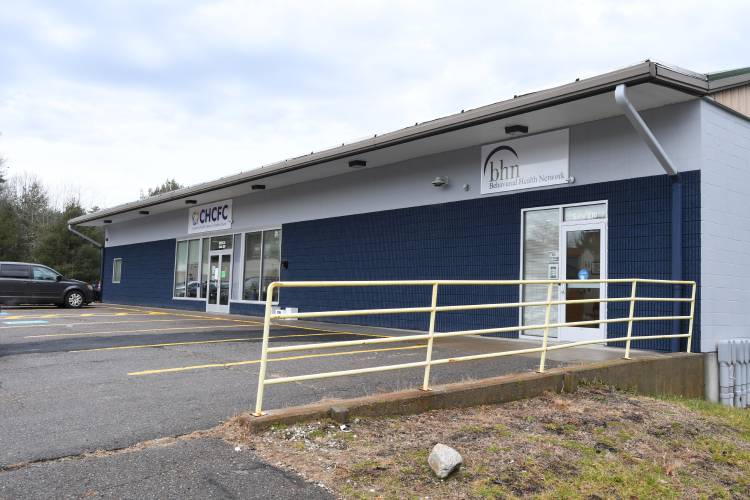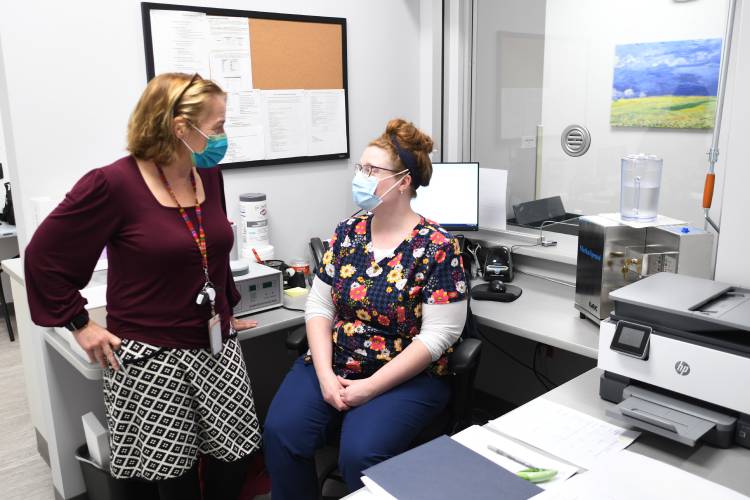Local success informs federal guidelines on addiction treatment
| Published: 04-03-2024 5:00 PM |
The federal government is marching to the beat of Behavioral Health Network’s drum in its new methadone treatment regulations, effective Tuesday, April 2.
BHN, a mental health service provider in western Massachusetts with methadone clinics in Greenfield, Springfield, Holyoke and Orange, wrote numerous letters to the federal Substance Abuse and Mental Health Services Administration suggesting modernized rules and regulations on methadone, an opioid antagonist that curbs the intense withdrawal symptoms faced by those looking to end their drug use. SAMHSA officially adopts these policies on Tuesday, April 2.
The amended federal policy is expected to expand methadone treatment for those in opioid addiction recovery by allowing patients to take methadone home with them at the discretion of practitioners. It also increases the maximum methadone dosage practitioners are allowed to administer to first-day patients from 30 milligrams to 50 milligrams, and allows nurse practitioners and physicians to order methadone without a special waiver.
The updated rules also increase access to methadone treatment for those who are incarcerated, changing the legislation’s language to allow jails and prisons to use methadone in their drug treatment protocols.
“We want to get people out of the world of ‘liquid handcuffs’ with methadone clinics, where you have to come to the clinic every day forever and ever — you can’t live the rest of your life like that,” said BHN’s Medical Director for Substance Use Disorders Dr. Ruth Potee, who was asked to give a congressional briefing on methadone on Capitol Hill on Feb. 6. “People who come to our clinic and meet our criteria get take-home bottles, which means they can work and take care of their children or do whatever they need to do without being tied to a clinic.”
The new regulations mark some of the first federal changes to methadone laws since 1973 when the Nixon administration began regulating the relatively new medicine. Potee said that some strict restrictions on methadone treatment practices made sense in the 1970s, when poppy-based heroin was the most common illicit opiate on the market and methadone was still in its nascent stages as a treatment.
With high-power opioids such as fentanyl sweeping through the country’s illicit drug market, Potee said the restrictions are outdated and that BHN has had to modify its dosages over the last five or 10 years to bring treatment up to speed with fentanyl addiction.
“The drug supply has become much deadlier, much more toxic. When we’re losing 107,000 Americans every day to overdose, we really need all of the effective medications to treat opioid use, to have them highly accessible and readily available for patients who need treatment,” Potee said. “There was a sense that addicts always lie and that patients can’t be trusted, and I believe that most people coming to a methadone clinic are trying to get better. … The risks of not making methadone readily available far outweigh the risks of making methadone available.”
Article continues after...
Yesterday's Most Read Articles
 Sportsman’s Corner: The quest for the Super Slam
Sportsman’s Corner: The quest for the Super Slam
 Cryptozoology exhibits featured at Education Earth Museum
Cryptozoology exhibits featured at Education Earth Museum
 Athol Police Logs: April 12 to April 19, 2024
Athol Police Logs: April 12 to April 19, 2024
 Athol Royalston Middle School Honor Roll Term 3
Athol Royalston Middle School Honor Roll Term 3
 Work on Pinedale Avenue Bridge connecting Athol and Orange to resume
Work on Pinedale Avenue Bridge connecting Athol and Orange to resume
 Longtime public servant Richard Sheridan dies at 78
Longtime public servant Richard Sheridan dies at 78
Although the revised regulations take effect today, SAMHSA rolled out eased restrictions for certain addiction treatment clinics on a temporary basis last May, allowing BNH to begin administering take-home methadone last year. Potee said the new protocols have had a positive effect on patients so far.
“Patients will say ‘This drug saved my life. My life is back to normal again. I’m working, I’m out with my kids…’” Potee said. “People describe lives that are in control again and they’ll say ‘If I didn’t have take-home bottles from this clinic, I couldn’t do what I needed to do, I couldn’t go to work.’”
Treating roughly 2,000 patients across its four clinics, Potee added that BHN allows walk-in treatment, collaborates with other clinics throughout the country, and generally aims to set an example in addiction treatment nationwide. Since BHN opened its Orange clinic at the end of 2021, the North Quabbin region has seen a 40% decrease in overdose deaths.
“Our job is to meet people where they are, be there for them when they’re ready to start treatment and prove to other clinics that a way of approaching treatment with methadone need not be so punishing or carceral. It doesn’t have to look that way for people to do well,” Potee explained. “For me, it’s a statement that rural areas can have a big, outsized impact on the policies of a state and a country. This region, long known to have an opioid problem, and yet long known to have a public health-focused approach to improving things … We really are a model to other areas on how to do it and how to do it well.”
For more information on SAMHSA’s updated regulations, visit bit.ly/3TXIsqA.
Anthony Cammalleri can be reached at acammalleri@recorder.com or 413-930-4429.



 UMass student group declares no confidence in chancellor
UMass student group declares no confidence in chancellor State Senate budget funds free community college for all
State Senate budget funds free community college for all